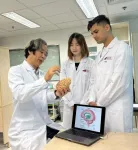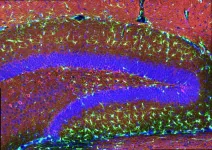(Press-News.org) Deep learning — a form of artificial intelligence capable of improving itself with limited user input — has radically reshaped the landscape of biomedical research since its emergence in the early 2010s. It’s been particularly impactful in genomics, a field of biology that examines how our DNA is organized into genes and how these genes are activated or deactivated in individual cells. Despite this synergy, genomics researchers wanting to employ this technology are often challenged by the actual coding necessary to analyze vast pools of dense data.
Now, researchers at University of California San Diego have simplified this task for scientists by creating a new deep-learning platform that can be quickly and easily adapted to suit a wide variety of different genomics projects. The newly-developed software, named EUGENe, is detailed in a study published November 16, 2023 in Nature Computational Science.
“Each of our cells has the same DNA, but the way that DNA is expressed changes what our cells look like and what they do,” explained Hannah Carter, PhD, associate professor in the Department of Medicine at UC San Diego School of Medicine. “Deep learning can provide valuable insights into the biological machinery driving this variety, but it can be challenging to implement for researchers without extensive computer science expertise. We wanted to create a platform that can help genomics researchers streamline their deep learning data analysis to make predictions from raw data."
Although genes coding for specific proteins make up only about 2% of our total genome, the remaining 98% of our DNA sequence, often referred to as "junk" DNA with no known function, plays a crucial role in determining when, where and how certain genes are activated. Unraveling the functions of these non-coding regions of the genome is a longstanding goal of genomics researchers, and deep learning has proven to be a powerful tool for achieving this goal — at least when researchers can figure out how to use it.
“A lot of existing platforms require many hours of coding and data wrangling to use,” said first author Adam Klie, a PhD student in the Carter’s lab. “Most projects require researchers to start from scratch, which takes expertise that not all labs interested in this stuff have access to.”
Klie designed the new software to address the computing challenges he faced in his own work.
“With EUGENe, you give an algorithm a sequence of DNA and ask it to make predictions about anything you’d expect that DNA could predict, such as whether a particular DNA sequence is functional or whether it regulates a gene in a certain biological context,” Klie said. “This lets you explore properties of the DNA sequence and ask what would happen if I modified this piece here or moved this piece there. This is particularly relevant for researchers studying complex genetic disorders where many different sequences are implicated.”
The researchers tested EUGENe by attempting to reproduce the results of three existing genomics studies that utilized several different types of sequencing data. Ordinarily, analyzing these different types of data would require mixing and matching multiple technology platforms. However, EUGENe proved adaptable enough to reproduce the findings of each of these studies.
“Being able to reproduce results is critically important in all scientific research, but can be very difficult in genomics studies that use deep learning,” said Carter. “EUGENe is already showing a lot of promise in how adaptable it is to different types of DNA sequencing data and supporting a lot of different deep learning models. We hope it will evolve into a platform that can support collaborative tool development by the research community and accelerate genomics research.”
While the current version of EUGENe works on many types of genomic data, the researchers are working on expanding its scope to include an even wider variety of data types, such as single-cell sequencing data, which looks at the genomics of individual cells instead of in a whole tissue. They also plan to make EUGENe available to research groups around the world.
“One of the exciting things about this project is that the more people use the platform, the better we can make it over time, which will be essential as deep learning continues to evolve so rapidly,” said Carter. “We hope that our platform will open many doors for researchers in this field and help them answer new questions about the complex molecular machinery that’s inside all of us.”
Full link to study: https://www.nature.com/articles/s43588-023-00544-w
Co-authors of the study include: David Laub, James V. Talwar, Joe J. Solvason and Emma K. Farley at UC San Diego, Hayden Stites at Daniel Land High School and Tobias Jores at University of Washington.
###
END
Introducing EUGENe: an easy-to-use deep learning genomics software
New technology developed by UC San Diego scientists aims to make deep learning more accessible to genomics researchers around the world
2023-11-16
ELSE PRESS RELEASES FROM THIS DATE:
Hunger hormones impact decision-making brain area to drive behavior
2023-11-16
A hunger hormone produced in the gut can directly impact a decision-making part of the brain in order to drive an animal’s behaviour, finds a new study by UCL (University College London) researchers.
The study in mice, published in Neuron, is the first to show how hunger hormones can directly impact activity of the brain’s hippocampus when an animal is considering food.
Lead author Dr Andrew MacAskill (UCL Neuroscience, Physiology & Pharmacology) said: “We all know our decisions ...
Epidemic-economic model provides answers to key pandemic policy questions
2023-11-16
University of Oxford news release
Institute of New Economic Thinking
Embargoed until Thursday, 16 November 2023, 16:00 GMT
Is lockdown an effective response to a pandemic, or would it be better to let individuals spontaneously reduce their risk of infection? Research published today suggests these two highly-debated options lead to similar outcomes.
A ground-breaking economic-pandemic model, created by an international team of researchers, addresses some of the key policy debates of the Covid-19 pandemic but it ...
New research advances understanding of cancer risk in gene therapies
2023-11-16
Medical research has shown promising results regarding the potential of gene therapy to cure genetic conditions such as sickle cell disease and the findings of this study, published in Nature Medicine, offer important new insights into processes happening in the body after treatment.
The present study looked at samples from six patients with sickle cell disease who were undergoing gene therapy as part of a major clinical trial at Boston Children’s Hospital. The research brought together an international team of experts, to take a closer look at the genetic changes in the stem cells of patients before and after gene therapy ...
A small molecule blocks aversive memory formation, providing a potential treatment target for depression
2023-11-16
Depression is one of the most common mental illnesses in the world, but current anti-depressants have yet to meet the needs of many patients. Neuroscientists from City University of Hong Kong (CityU) recently discovered a small molecule that can effectively alleviate stress-induced depressive symptoms in mice by preventing aversive memory formation with a lower dosage, offering a new direction for developing anti-depressants in the future.
“Depression affects millions of individuals worldwide, necessitating more effective treatments. Conventional methods, such as drug therapy with delayed onset of action and psychotherapy, have limitations in yielding satisfactory ...
Plants that survived dinosaur extinction pulled nitrogen from air
2023-11-16
DURHAM, N.C. -- Once a favored food of grazing dinosaurs, an ancient lineage of plants called cycads helped sustain these and other prehistoric animals during the Mesozoic Era, starting 252 million years ago, by being plentiful in the forest understory. Today, just a few species of the palm-like plants survive in tropical and subtropical habitats.
Like their lumbering grazers, most cycads have gone extinct. Their disappearance from their prior habitats began during the late Mesozoic and continued into the early Cenozoic Era, punctuated by the cataclysmic asteroid impact and volcanic activity that mark the K-Pg boundary 66 million years ago. However, unlike the dinosaurs, somehow a few groups ...
The mind’s eye of a neural network system
2023-11-16
WEST LAFAYETTE, Ind. – In the background of image recognition software that can ID our friends on social media and wildflowers in our yard are neural networks, a type of artificial intelligence inspired by how own our brains process data. While neural networks sprint through data, their architecture makes it difficult to trace the origin of errors that are obvious to humans — like confusing a Converse high-top with an ankle boot — limiting their use in more vital work like health care image analysis or research. A new tool developed at Purdue University makes finding those errors as simple as spotting mountaintops from an airplane.
“In a sense, if a neural ...
Study finds motorist disorientation syndrome is not only caused by vestibular dysfunction
2023-11-16
Amsterdam, November 16, 2023 – A large case series aimed at understanding the factors underlying Motorist Disorientation Syndrome (MDS) has found that patients experience severe, consistent symptoms comparable to vestibular migraine. Previously there has been speculation that underlying peripheral vestibular hypofunction, when the inner ear part of the balance system is not working properly, contributes to this presentation. However, vestibular deficits were not a consistent feature in the patients studied. The findings have been published in the Journal of Vestibular Research.
In ...
Rabies virus variants from marmosets are found in bats
2023-11-16
Rabies virus variants closely related to variants present in White-tufted marmosets (Callithrix jacchus) have been detected in bats in Ceará state, Northeast Brazil.
Rabies is a deadly disease for humans. Its emergence in distinct wildlife species is a potential source of human infection and hence a public health concern. Marmosets are common in forests and conservation units throughout Brazil. In or near urban areas, they are often captured as pets and later abandoned. They have been linked ...
How a mutation in microglia elevates Alzheimer’s risk
2023-11-16
A rare but potent genetic mutation that alters a protein in the brain’s immune cells, known as microglia, can give people as much as a three-fold greater risk of developing Alzheimer’s disease. A new study by researchers in The Picower Institute for Learning and Memory at MIT details how the mutation undermines microglia function, explaining how it seems to generate that higher risk.
“This TREM2 R47H/+ mutation is a pretty important risk factor for Alzheimer’s disease,” said study lead author Jay Penney, a former postdoc in the MIT lab of Picower Professor Li-Huei ...
International team uses Insilico Medicine’s AI platform to find dual targets for aging and cancer
2023-11-16
An international research team is the first to use artificial intelligence (AI) analysis to identify dual-purpose target candidates for the treatment of cancer and aging, the most promising of which was experimentally validated. The findings were published in the journal Aging Cell.
Researchers from the University of Oslo, University of Chicago Pritzker School of Medicine, and clinical stage AI-driven drug discovery company Insilico Medicine used Insilico’s AI target discovery engine, PandaOmics, to analyze transcriptomic data derived from ...
LAST 30 PRESS RELEASES:
This ancient plant-eater had a twisted jaw and sideways-facing teeth
Jackdaw chicks listen to adults to learn about predators
Toxic algal bloom has taken a heavy toll on mental health
Beyond silicon: SKKU team presents Indium Selenide roadmap for ultra-low-power AI and quantum computing
Sugar comforts newborn babies during painful procedures
Pollen exposure linked to poorer exam results taken at the end of secondary school
7 hours 18 mins may be optimal sleep length for avoiding type 2 diabetes precursor
Around 6 deaths a year linked to clubbing in the UK
Children’s development set back years by Covid lockdowns, study reveals
Four decades of data give unique insight into the Sun’s inner life
Urban trees can absorb more CO₂ than cars emit during summer
Fund for Science and Technology awards $15 million to Scripps Oceanography
New NIH grant advances Lupus protein research
New farm-scale biochar system could cut agricultural emissions by 75 percent while removing carbon from the atmosphere
From herbal waste to high performance clean water material: Turning traditional medicine residues into powerful biochar
New sulfur-iron biochar shows powerful ability to lock up arsenic and cadmium in contaminated soils
AI-driven chart review accurately identifies potential rare disease trial participants in new study
Paleontologist Stephen Chester and colleagues reveal new clues about early primate evolution
UF research finds a gentler way to treat aggressive gum disease
Strong alcohol policy could reduce cancer in Canada
Air pollution from wildfires linked to higher rate of stroke
Tiny flows, big insights: microfluidics system boosts super-resolution microscopy
Pennington Biomedical researcher publishes editorial in leading American Heart Association journal
New tool reveals the secrets of HIV-infected cells
HMH scientists calculate breathing-brain wave rhythms in deepest sleep
Electron microscopy shows ‘mouse bite’ defects in semiconductors
Ochsner Children's CEO joins Make-A-Wish Board
Research spotlight: Exploring the neural basis of visual imagination
Wildlife imaging shows that AI models aren’t as smart as we think
Prolonged drought linked to instability in key nitrogen-cycling microbes in Connecticut salt marsh
[Press-News.org] Introducing EUGENe: an easy-to-use deep learning genomics softwareNew technology developed by UC San Diego scientists aims to make deep learning more accessible to genomics researchers around the world






